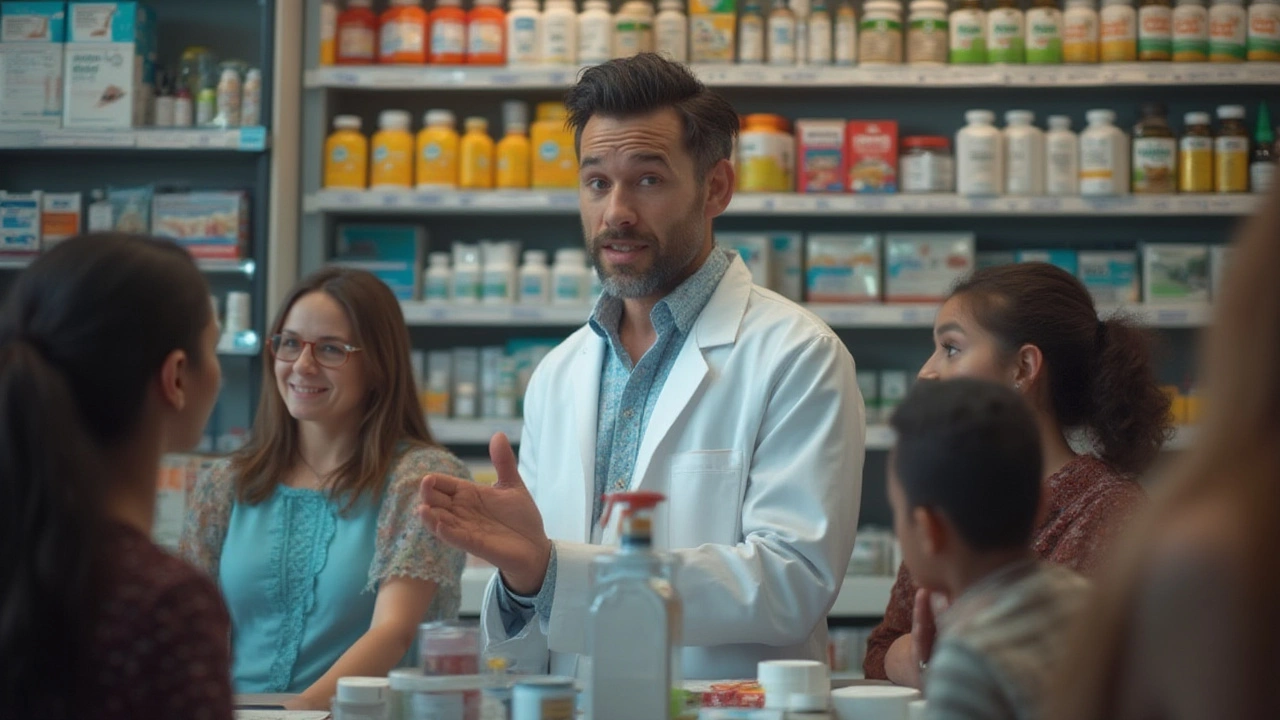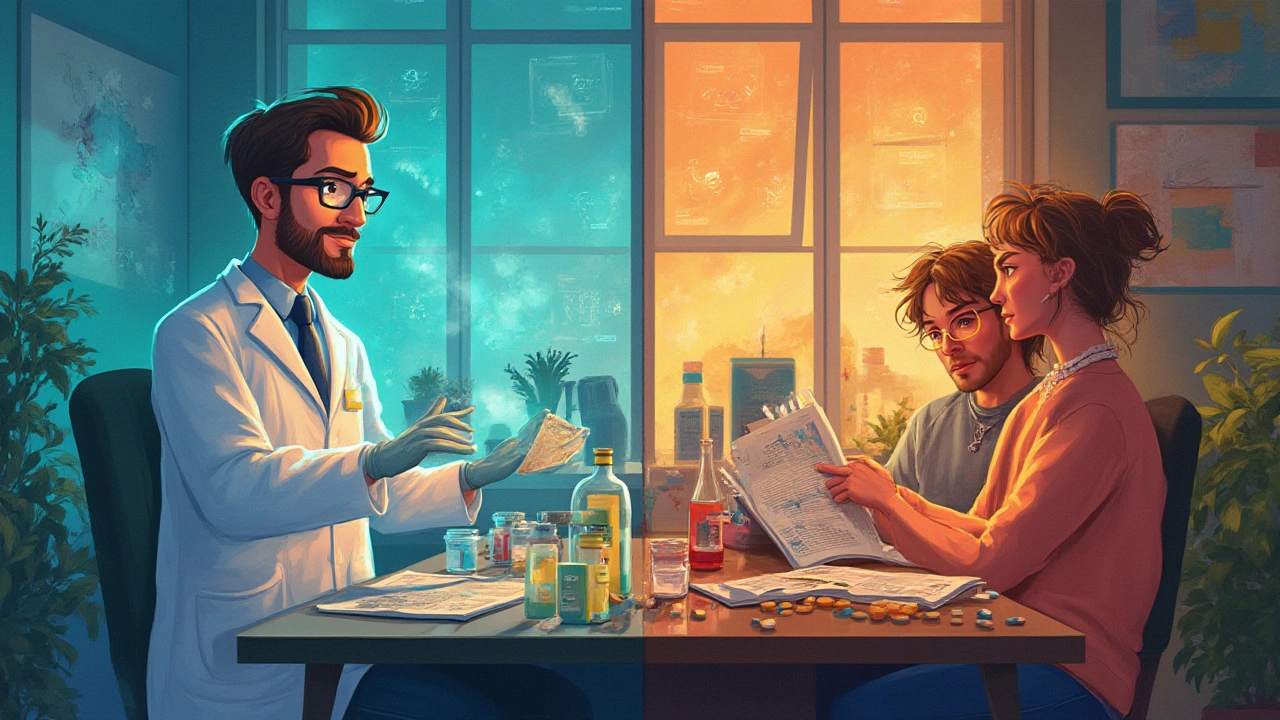There’s a dizzying wave of health hacks out there: magic pills, miracle teas, and herbal wonders, all promising instant cures. At the same time, pharmacies fill billions of prescriptions a year. Who do you trust—a chemist in a lab coat or a wellness influencer with a perfect smile? The answer matters, because your choices could shape your life, not just your day. Some myths are quirky city legends, but others can lead to dangerous decisions. You only get one body—sorting fact from fiction is crucial.
How Pharmaceuticals Earn Their Place in Medicine Cabinets
Every box of medicine on a pharmacy shelf represents years—sometimes decades—of research and billion-dollar investments. Pharmaceutical drugs don’t just appear out of thin air; even a simple bottle of paracetamol went through headaches (pun intended) before it became a household staple. It starts with thousands of compounds, only a handful of which ever show promise in the lab.
Take antibiotics, for example—arguably the poster child for modern medication. Alexander Fleming accidentally discovered penicillin in 1928, but turning that mold into a pill took years of refining and trial runs. Now, antibiotics have doubled the human lifespan, slashing deaths from infections that were once routine death sentences. That’s the sheer muscle of evidence-based medicine.
But flashy stories can’t hide the cold hard facts—about 90% of experimental drugs fail somewhere along the journey. First, researchers have to prove a compound works in isolated cells, then in animals, then in gradually larger groups of humans. Each hurdle filters out drugs that cause nasty side effects, don’t work better than sugar pills, or interact in weird ways with our bodies. By the time a medication lands on your GP’s desk, it’s survived brutal scrutiny. Australia’s own TGA (Therapeutic Goods Administration) brags some of the world’s strictest standards, blocking anything with even a whiff of trouble.
But more isn’t always better. Some people figure, “If these meds helped, doubling up surely can’t hurt.” Wrong. Most pharmaceuticals have a very specific dosage window—stray too high, and you up the risks for liver damage, heart problems, or worse. Paracetamol overdoses send over 8,000 Aussies to emergency rooms every year. Medications are designed for a reason—follow the packaging advice or a doctor’s instruction like a Bible.
Now, not all problems have easy pharmaceutical solutions—take chronic fatigue or irritable bowel syndrome. The pipeline for these issues is peppered with false starts and wild goose chases. Some drugs stumble through clinical trials and never deliver the long-term relief patients crave. Even “blockbuster” antihypertensives and statins owe their popularity to consistently chipping away at disease risk, not magical transformations.
Still, a mountain of data separates real drugs from health fads. Studies pool tens of thousands of people, randomise them into different treatment groups, and track every blip in blood pressure, cholesterol, pain, or cancer risk. If benefits outweigh the risks, regulators give the thumbs-up. If not, drugmakers head back to the drawing board. Nothing short of hard numbers gets a drug past the finish line.
One tip: ask your GP or pharmacist about the backing behind your pills. If the phrase "double-blind clinical trial" comes up, that’s a gold seal. If it’s “anecdotal reports and traditional use,” pump the brakes. Your health deserves more than a guess.

The Enduring Power of Myths—And the Surprising Reasons People Fall for Them
So why do so many folks ignore the meticulous science and chase quirky remedies instead? Myths spread partly because science itself feels messy; hearing “maybe, sometimes, possibly” from doctors lacks the neat certainty of a kitchen concoction or celebrity tip. Everybody has that relative who swears by garlic’s magic or the mate who drinks celery juice for every problem under the sun.
Many myths have an old-school charm. Plants did, after all, inspire some real medicines—aspirin came from willow bark. But crushing leaves in your backyard rarely gives you the right dose or purity. Worse, natural doesn’t always mean safe; nightshade berries are “natural,” but they’ll put you six feet under faster than you can say holistic.
The internet fans these flames big time. Watch a slick TikTok video, and suddenly turmeric tea seems mightier than morphine. Myths also piggyback on fear, especially when drugs come with side effect warnings. Aloe vera might sound softer than a steroid cream, but that’s not enough to heal eczema. If something seems too good—or too simple—to be true, that’s usually a sign to dig deeper.
Some myths actually mask the real problem. “Going gluten-free cured my headaches!” Well, maybe, but maybe it was the extra vegetables and less processed food that did the trick. One Harvard study found most “miracle cures” fail to beat placebo in blinded trials, but people don’t notice—they only remember when they feel better and forget all the times they don’t.
Aussies in particular seem drawn to natural therapies—almost two in three have used complementary medicine in the past year. There’s nothing wrong with healthy scepticism or enjoying a herbal tea, but when myths stop people from seeking actual treatment, or when they push people to ditch prescribed meds, things get dicey. In 2023 alone, several Aussies died from abandoning insulin in favour of homeopathic drops. Nobody should gamble their life on hearsay.
Watch out as well for marketing terms: “clinically proven,” “doctor recommended,” and “cure” don’t always mean what you think. If the only evidence is small, poorly run studies or glowing Amazon reviews, be cautious. TGA-registered listings are a good tip-off that a product has met basic safety, though not all are effective—so check for peer-reviewed support.
If you’re curious about a “natural” treatment, first see if there’s actual science behind it. Some options—like certain probiotics for gut health—do have fast-growing evidence. Others, like silver-based supplements or mega-dose vitamins, can cause real harm. As a rule: if you can buy it from a random website with zero controls, take a rain check.

Choosing What Actually Works: Tips for Smarter Health Decisions
Want to spot the real deal? You don’t need a PhD, just a few habits. First off: don’t dismiss all home remedies outright, but always ask, “How do you know this works? What’s the proof?” Use this basic checklist:
- Is it backed by large, double-blind studies, not just testimonials?
- Is it registered by the TGA or a similar trusted body?
- Does your GP or pharmacist recommend it for your specific issue?
- Are there any known side effects, drug interactions, or red flags for your conditions?
- Can you find unbiased reviews, like on reputable medical websites or databases?
Don’t forget—sometimes “working” doesn’t mean feeling better right away. Cholesterol meds lower risk silently over years, while painkillers act in minutes. Be realistic about what you expect, and alert your doctor if something isn’t working as hoped.
Avoid combining new herbal supplements with prescriptions without checking—herbs can mess with enzymes that process vital meds, sometimes dulling or dangerously boosting effects. St. John’s Wort, hugely popular for low moods, can wipe out birth control or anxiety meds by accident.
List all your remedies when seeing a doctor, even if they seem innocent. The more open you are, the better they can guide you. And if you spot wild promises like “detox your liver in 24 hours” or “cure diabetes overnight,” that’s your cue to walk away, no matter how persuasive the promo looks.
A keen eye and a splash of scepticism save you money—and sometimes your life. When in doubt, check in with a health professional, not Google or a chat room. Real science may not always be glamorous, but its wins—like insulin for diabetes and vaccines for polio—are impossible to deny.
The bottom line here? Feel free to enjoy the odd ginger tea and roll of eucalyptus ointment, but don’t ditch the proven stuff from your medicine cabinet. Treatments earn their reputation one tough study at a time, not because someone’s nan said so. Your best bet is the blend: evidence-led medicine for the big stuff, and well-chosen home comforts for support—but with your eyes wide open. Myth-busting is more than a science lesson; it’s possibly the best health skill you’ll ever pick up.

